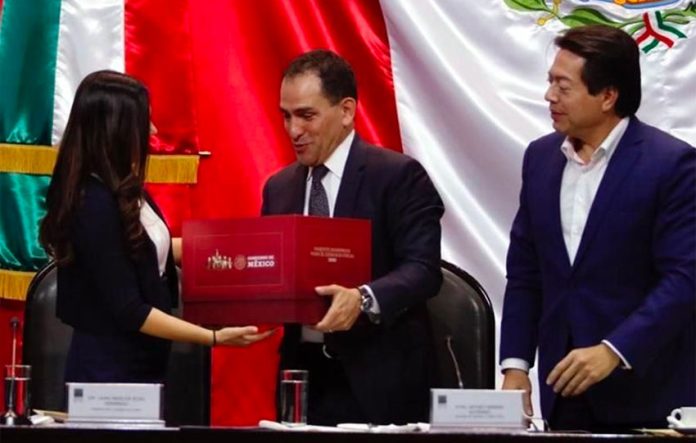Spending on social welfare programs, security and the state oil company is a priority in the 2020 budget, said Finance Secretary Arturo Herrera on Sunday.
Herrera delivered the 2020 Economic Package to the lower house of Congress, declaring that it is a budget based on fiscal discipline that will generate macroeconomic stability and financial certainty.
“We believe that it is a realistic package and we want it to be perceived that way by markets,” the finance secretary told lawmakers.
The package outlines total spending of 6.05 trillion pesos (US $310 billion), a 4% increase compared to the 2019 budget.
Herrera forecast economic growth of between 0.6% and 1.2% this year and a range of 1.5% to 2.5% for 2020.
The government is targeting a primary fiscal surplus of 0.7% of GDP in 2020, a figure 0.6% lower than the surplus forecast in a preliminary budget forecast sent to Congress in April.
Herrera said that about 60% of the budget is allocated to fixed spending including payments to local governments and pensions, while the remaining 40% will mainly go to “three main destinations: welfare, security and . . . fiscal support for Pemex.”
The secretary said that spending on welfare is intended to reduce income inequality, noting that almost half of all Mexicans live in poverty.
“The levels of income and inequality that are seen in the south of the country are very different from those seen in the center and north of the country. Therefore . . . to address those gaps . . . we’re placing significant emphasis on programs associated with social well-being,” Herrera said.
The budget proposes funding of 257 billion pesos for eight social programs, including the youth employment and senior citizen pension schemes.
Just under 59.2 billion pesos is earmarked for spending on “security and citizen safety,” a 6.5% increase over the 2019 budget, while the army and navy are to get combined funding of around 127.5 billion pesos.
The majority of the former amount is expected to be allocated to the National Guard. The new security force was formally inaugurated on June 30 and deployed to 150 regions across the country in July but the government intends to expand coverage to 266 regions.
Security Secretary Alfonso Durazo said previously that he expected the 2020 budget to provide some 56 billion pesos in funding for the new security force, which has been tasked with not only combating record high levels of insecurity but also stemming the flow of undocumented migrants to the Mexico-United States border.
Herrera described insecurity as a problem that “hurts Mexican families” and one that has to be “attacked head-on.”
For Pemex, the budget earmarks 523.4 billion pesos (US $26.8 billion), a 9% increase compared to 2019 funding.
Herrera highlighted that the beleaguered state-run company, whose oil production has been declining for 14 years, will receive 86 billion pesos in extra support including a cash injection of 46 billion pesos.
The secretary stressed that the budget doesn’t call for taxes to be raised nor for the creation of any new ones. However, the government will aim to increase revenue by cracking down on tax evasion, among other measures.
Herrera noted that the global economy is slowing but said that monetary policy changes will help to stimulate the economy.
The central bank cut interest rates to 8% in August, citing slowing economic growth and lower inflation. Herrera said that the government expects rates to fall to 7.1% in 2020.
The 2020 Economic Package, the government’s second budget, anticipates that Mexican crude will sell for an average of US $49 per barrel in 2020, oil production will be 1.95 million barrels per day at the end of next year and a greenback will buy on average 20 pesos, which is slightly above the current rate of about 19.5.
Alfonso Ramírez Cuellar, president of the budget committee in the lower house of Congress, praised the budget for its “fiscal discipline and responsibility in spending.”
However, he said that the committee he leads will not be a rubber stamp, stating “I think there needs to be a greater effort in income generation.”
Alberto Ramos, chief Latin America economist at Goldman Sachs, said the package is “overall a relatively fair budget” but added that “the assumptions on growth and oil production are definitely on the optimistic side.
“The key question for investors and markets will be whether the administration is ultimately strongly committed to deliver the 0.7% of GDP primary fiscal target or not,” he added.
Source: El Economista (sp), Reuters (en)
